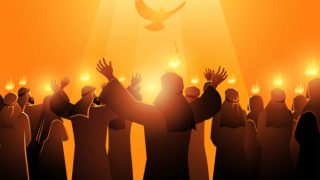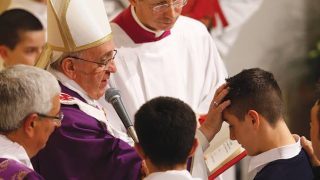
RECONCILIATION: A RETURN FROM A DISTANT COUNTRY
HOMILY FOR THE FOURTH SUNDAY OF LENT (LAETARE SUNDAY), YEAR C. Readings: Joshua 5:9-12; Psalm 34; 2 Corinthians 5:17-21 and Luke 15:1-3.11-32.
The fourth Sunday of Lent calls us to rejoice as the Latin verb ‘Laetare’ indicates, as similar to the third Sunday of Advent’s Gaudete. Today’s entrance antiphon goes thus: “Rejoice, Jerusalem, and all who love her. Be joyful, all who were in mourning; exult and be satisfied at her consoling breasts.” In view of this, the prodigal father invites us to rejoice at the return of the prodigal son from a distant country. The attached painting to this reflection gives a deeper meaning to this parable.
The original of this painting which was acquired by St. Catherine the great, in 1766 can be found in St. Petersburg Hermitage, in Russia. A great Dutch artist Rembrandt von Rijn who lived between 1606 and 1669 did the painting towards the end of his life.
The first reading enables a better understanding of the gospel. In it, the Lord said to Joshua, “This day I have rolled away the reproach of Egypt” (Joshua 5:9). This phrase refers to the many years of shame and degrading slavery Israel spent in Egypt. The reproach was rolled away by their radical trust and obedience to God, by taking the specific action He told them to. Therefore, God called Israel to a place called Gilgal, where they saw themselves as an obedient and trusting people. They stopped seeing themselves as they were in their slavery and bondage. Of course, this is the same work God wants to do in us by taking away the dishonor and shame of our previous sin and rebellion and seeing ourselves as who we are in Christ.
Christ in the gospel identifies with tax collectors and sinners, the Pharisees and Scribes murmured against His action of welcoming and eating with sinners. A taboo for the Messiah! The act of murmuring was reminiscent of the Israelites of old who grumbled about the way the Lord was leading them (Ex. 15:24). While the Pharisees and Scribes distanced themselves from sinners, Christ welcomes sinners and dines with them. For the Pharisees and Scribes, Christ condoned the behavior of sinners, which led to grumbling. In view of this, He tells the story of the prodigal son, which expresses the boundless love and mercy of God. This story has three major characters that helps us to examine ourselves: the younger son, the father and the elder brother.
Some notable things about the younger son call for reflection. In search for liberty, he came to self-realization and said, “Father, give me the share of property that falls to me” (Lk.15:12). By this act, the son was guilty of assuming the initiative that belongs to the father; treating his father as if he were dead; ignoring the obligation to his parents in their old age and breaking the family relationship by leaving. Such conduct is shameful. The father must be ashamed to have raised such a son. It was a moment of shame and degradation for the family like the Israelites who wandered in the wilderness for years. Similarly, the younger son gathered all and took to a far or distant country.
The phrase ‘distant/far country’ entails more than geography. The distance separates him from his father and all the father stands for. The distance is the addiction to sin that separates us from God and can make us lose our dignity as children of God. However, the son helps us to realize the moments we are tired and exhausted of staying in the family house; those moments we have said to those in authority over us such as our parents, bosses, teachers and superiors to give us what belongs to us. He reminds us of the moments we want to do things the way we want. In his self-realization, he said, “I will arise and go back to my father, and I will say to him, “Father, I have sinned against heaven and before you, I am no longer worthy to be called your son…” (Lk. 15:18).
The above leads us to the image of the Father. The father represents the law, the bond, authority and moral. With the level of sin/offense of the son, it is justifiable to reward him with retribution. He could have waited to punish him at his return, but the Father expresses something much more important: That is LOVE AND MERCY which is far greater than our sin. So, “While the son was still far off (sin), his Father saw him and was filled with compassion; he ran and put his arms around him and kissed him.” The Father did not allow him to finish his confession, he was just patiently waiting for him to turn back from his sin: the effort we make to return to God matters. The Father rejoiced at his return and was so fast to restore him back to his dignity, “Bring quickly the best robe and put it on him; and put a ring on his hand, and shoes on his feet…”
We can have a gaze at the painting again. The Father wants to give new life to the son that is why he puts the head of the son in the womb/stomach. The head of the son in the painting appears like that of a new born baby. No wonder Christ said to Nicodemus, unless you are born again, you cannot enter the kingdom of heaven (John 3:3). Take a look at the hands, the left hand is placed on his shoulder, which appears masculine, bigger than the right that appears feminine. The left hand on the shoulder gives PROTECTION and AFFECTION, while the right hand that appears on the back gives SECURITY and FIRMNESS. Invariable, the picture indicates that God is Father and Mother, or as some theologians prefer to say, God is a Father, with a heart of a Mother. In evaluation, with the character of the father, we may personalize these: am I loving? Merciful? Compassionate? Or do I wait for people to lie down and roll on the floor before I forgive them?
For the elder brother, after hearing all that was happening, he became ANGRY and refused to go in despite the Father’s pleas. He expressed self righteousness, but unknown to him that when he accuses his brother of having spent his money with prostitutes, he projects his unconscious desires. How did he know that the younger son spent the money on prostitutes? Was he there? In evaluation, are we so aggressive towards others? Do we easily get angry with others unnecessarily? Have I been too hard on people? Have I engaged in sexual fantasies? Have I looked at others lustfully? Have I read pornographic literature or looked at pornographic pictures, shows or movies? Have I masturbated? Have I been rebellious, disobedient and disrespectful to those in authority? Arrogant and stubborn? In view of these, St. Paul in the second reading invites us to seek a priest for reconciliation with God and man through the sacrament of penance.
Happy Laetare Sunday!
Fr. Ken Dogbo, OSJ










